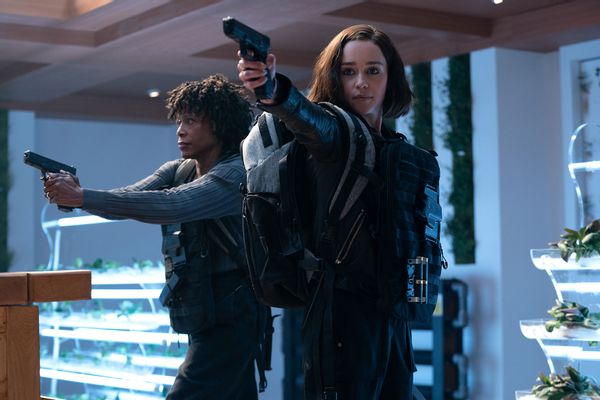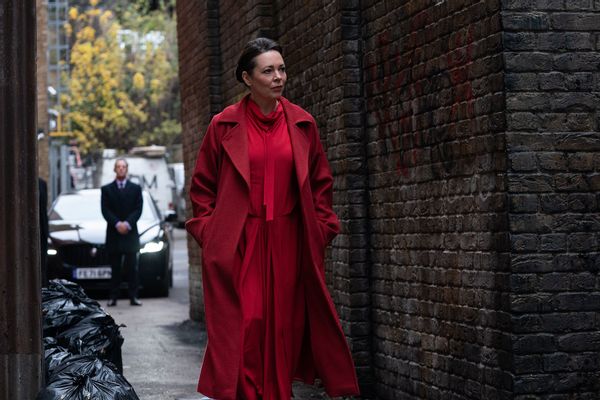
Two and a half years ago the Marvel Cinematic Universe officially crossed the TV threshold with "WandaVision," a creative homage to classic TV that used family sitcom tropes to explore the extents to which humans will go to avoid processing grief. The series also constructed a runway for "Doctor Strange in the Multiverse of Madness," which arrived a year later.
It's also a launchpad for several next-generation MCU characters including Monica Rambeau (Teyonah Parris) who returns in the studio's next major theatrical release "The Marvels," due out in November. "Ms. Marvel" is another point of connection, along with being one of 2022's underappreciated diamonds and another of Marcel's ever-rarer creative swings.
"Secret Invasion" doesn't directly follow "Ms. Marvel," but given Captain Marvel's connection to its main man Nick Fury (Samuel L. Jackson) you may be wondering what it lends to Carol Danvers' (and Brie Larson's) return. Franchise followers have been primed to track relevant character changes and subplots through Marvel's TV series and its movies, a tactic to make subscribing to Disney+ seem necessary.
However, and to my simultaneous regret and relief, "Secret Invasion" holds fewer FOMO molecules than unnecessary irritations.
There are a few updates concerning Fury and his relationship with the Skrulls, a race of aliens he and Danvers assist in "Captain Marvel," that may be referenced in the sequel. The bad news is a violent splinter faction of them infiltrated the highest levels of government and tried to eradicate humanity. They also played like green-skinned versions of the terrorists that Bucky and Sam chased on "The Falcon and the Winter Soldier." And a questionable headline concerns Emilia Clarke joining the MCU tent, and the finale's massively silly CGI battle to show off how overpowered her character G'iah is.
"Secret Invasion" also kills off Fury's right hand at S.H.I.E.L.D., Maria Hill (Cobie Smulders), a longstanding character in this universe. One can argue over whether this qualifies as a classic fridging: she was shot down both to motivate Fury's mission and make him a hunted man, thereby forcing him into space on a near-permanent basis.

Technically "Secret Invasion" is a lead-in to "Armor Wars," an upcoming feature starring Don Cheadle's James Rhodes, aka War Machine, and it forces a major retcon on his character that may end up irritating fans more than jump-starting his story. Even taking that into account, along with the fantastic cast (with Olivia Colman elevating the whole enterprise with her portrayal of top MI6 agent Sonya Falsworth), the entire series is defined and dogged by a lack of necessity.
Around this time last year, I observed that the popularity of a brand as stalwart as Marvel doesn't crash in a day. "It happens inch by inch, individual by individual, until enough of us awaken to the realization that diversions we once anticipated with a child's buzzy glee are slightly altered versions of the same increasingly mediocre commodity."
Consider us awake, then, and maybe a bit over it. Not at Marvel's oversaturation – we passed the waterlog point long ago. But the tendency to treat nearly every new character as a chess piece or two-dimensional symbol is tiresome.
Instead of introducing the audience to unfamiliar people with flaws and frailties that no amount of superstrength can entirely overcome, we're handed a slat in a bridge to the next project each of which feels less consequential than the last.
The state of TV and film has given me and many others plenty of reasons to rail against media companies' excessive reliance on franchising the life of existing IP. The very rich people feeding this addiction know its problem.
Michael Ireland, one of the co-heads of Paramount's motion picture group, was quoted in a recent Variety story admitting, "There needs to be a reason to make a sequel . . . It can't just be we've made six other versions of this same story, and here's a seventh."
This may sound like acquiescence or wisdom, but all he's saying is a different version of what Disney CEO Bob Iger told CNBC in early July about Marvel's future and that of "Star Wars," which he augurs will be leaner than in the past.
He condemned the glut of MCU-related TV shows for the subpar performances of such films as "Ant-Man and the Wasp: Quantumania," explaining the TV properties "diluted focus and attention" from its movies. I didn't agree with a lot of what Iger said in that interview but in this, we are of like mind.
This is also why I am hesitant to be excited about "Ahsoka." The "Star Wars" side of Disney+ yielded "Andor" and "The Mandalorian" but it also made us suffer through "Obi-Wan Kenobi" and "The Book of Boba Fett."
And yet, wasn't "Andor" worth our attention? Wasn't "Loki" and "Ms. Marvel," and on the theatrical side of the equation, "Spider-Man: Across the Spider-Verse"? We can rue the fact that superheroes and the Skywalker saga devour attention and eyeballs while admitting that some of these titles earn their keep. Mining IP isn't evil. Stripping stories of their potential and magic by reducing them to CGI slugfests might be.
Even so, it isn't quite fair for Iger to place full blame for Marvel's decline on its TV shows. Many of its theatrical releases were striking out on their own, saddled with astronomical budgets while neglecting to establish why we shouldn't wait for their video-on-demand release.

The summer's loudest arguments in favor of the theatrical experience take the form of a biopic about the man who ushered the atomic bomb into existence and, pertinent to this topic, a movie about a doll that blends bumper sticker feminism with Gen X humor.
Mattel is already rubbing its palms together in anticipation of constructing a universe out of its toy box, but its big bang will be short-lived if it doesn't learn from the dilution of the franchise that started us down this path.
Eleven years ago in "The Avengers," Nick Fury launched a monologue that came to define the MCU. "The idea was to bring together a group of remarkable people to see if they could become something more," he explained. Thanks to a platform featuring these heroes and almost everyone they've met, that group has expanded well beyond the remarkable while sacrificing narrative discipline, purpose and power. "Secret Invasion" is simply the latest exhibit of this. Hopefully, the next few will be among the last. But don't count on that.







